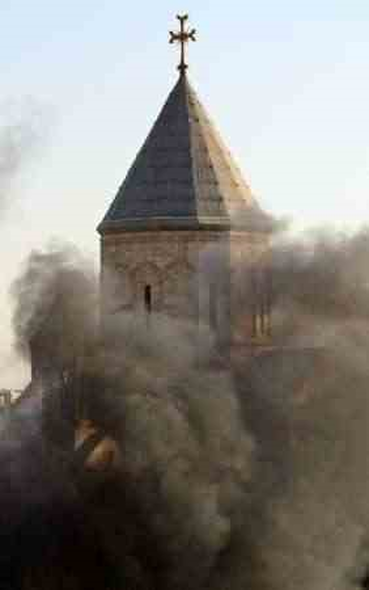Todd Daniels, Regional Manager for the Middle East
10/02/2015
Washington, D.C.
International Christian Concern
"Nearly eight churches, including St. Ephrem Syriac Orthodox Church" were used for slaughtering animals, Jamil Diarbakerli, Head of the Assyrian Monitor for Human Rights (AMHR) told International Christian Concern (ICC).
"This incident comes as the new link in the series of violations of the Daash [ISIS] terrorist organization of churches and religious temples in the city of Mosul which is controlled by them since the June 10, 2014," AMHR said in a press release.
Once home to tens of thousands of Christians, now not a single Christian is believed to remain in Mosul. Nearly all Christians fled Mosul when the city fell to ISIS on June 10. An ultimatumwas given to the remaining Christians that they must convert to Islam, pay a tax or leave the city by noon on July 19 or they would face death.
Since then, ISIS has occupied or destroyed all of the remaining churches and Christian properties or else converted them into mosques.
According to eyewitnesses who are still in Mosul, ISIS is going to great lengths to remove any remnants of the city's Christian past.
"The cross is ISIS's main enemy; that is why today no traces of crosses can be seen in Mosul,"A.S., a journalist writing anonymously told Ankawa News.
"The dwellings were ravaged with great fury - and the vestiges of this hatred for Christianity can be seen here to this day... As for churches and monasteries, whole teams are involved in the job of dynamiting or partially demolishing their buildings," A.S. continued.
In June 2015, ISIS announced that the St. Ephrem Church would be converted into the "mosque of the mujahideen," a place for its extremist fighters to pray and worship.
"This was my church from childhood," Rita, a Christian from Mosul now living in Northern Iraq told ICC. "In Christmas and Easter the church was full of people. This church is the biggest one in Mosul; there would be thousands of people," she remembered fondly.
The Christian community from Mosul, and from the Christian villages of the Nineveh Plains, are wondering if they will ever be able to go back.
Unless something dramatic changes they don't see it as something likely in the near future.
"The first condition is that there must be international protection for anybody returning. The second is that the Christians must be allowed to create their own semi-independent administrative entity," Nawzat Shamdeen wrote in a Niqash special report on Iraq's Christians.
The final condition, as Patriarch Louis Sako outlined in a March 2015 speech to the United Nations Security Council, would be assistance to help them rebuild their lives in the lands that have been conquered.
Other thinkers have laid out a similar strategy for Christians to be "rescued, restored, and returned" to their homelands.
Until that happens, Christians will remain at a loss trying to decide whether to wait things out or to look towards the West and join the flood of migrants toward Europe and the United States.
While they wait, the news coming from their homelands is increasingly gruesome as ISIS is trying to solidify their hold on territory in Iraq and Syria, slaughtering not only sheep but those who challenge their control.
For interviews, contact Olivia Miller, Communications Coordinator: press@persecution.org# # #
You are free to disseminate this news story. We request that you reference International Christian Concern (ICC) and include our web address, www.persecution.org. ICC is a Washington D.C.-based human rights organization that exists to help persecuted Christians worldwide. ICC provides Awareness, Advocacy, and Assistance to the worldwide persecuted Church. For additional information or for an interview, contact ICC at 800-422-5441.
International Christian Concern
2020 Pennsylvania Ave. NW #241, Washington, D.C. 20006
www.persecution.org | E-mail: icc@persecution.org



 RSS Feed
RSS Feed